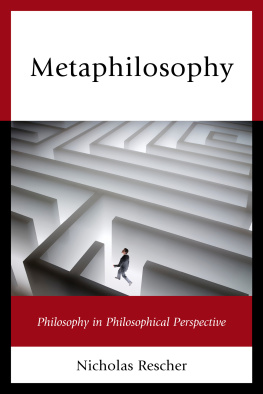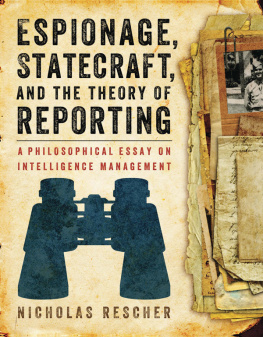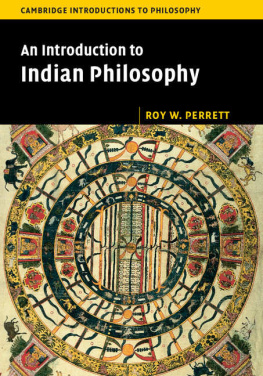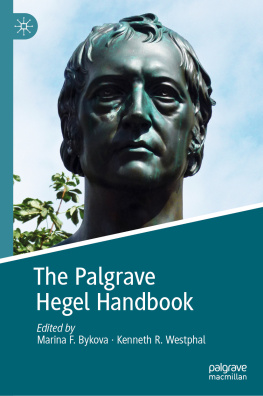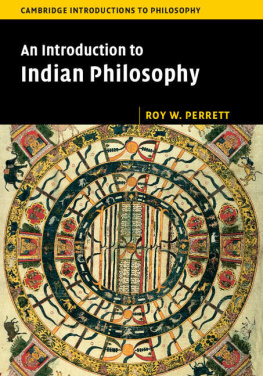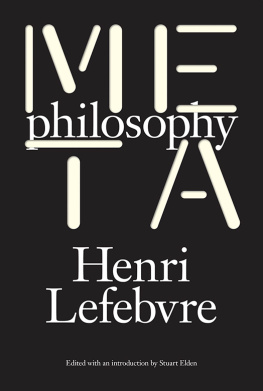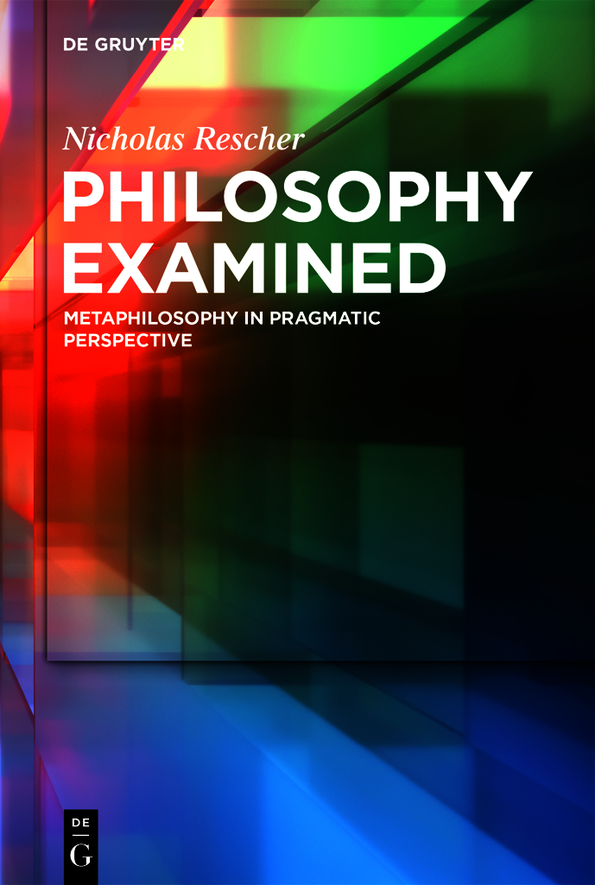The Deutsche Nationalbibliothek lists this publication in the Deutsche Nationalbibliografie; detailed bibliographic data are available on the Internet at http://dnb.dnb.de.
Philosophizing
Aristotle said it best. Man by nature desires to know. The absence of information can be as distressing as that of food.
Philosophizing is a purposive enterprise that calls for addressing the big question of the human condition: mans place in the universe and the proper management of the obligations and opportunities of human life. It is a venture in rational inquiry that begins with problems and seeks solutions.
It is thus a purposive enterprise whose goal is to remove unknowing and puzzlement regarding the world and our place in its scheme of things. Answering the big questions is the name of the game. It is a project in answering pivotal questions about realty and its world on the basis of experience.
But we cannot contrive satisfactory answers out of thin air: to obtain credible conclusions we require premises. These will be the fruits f experience and can range from individual judgements and personal beliefs to universally valid information secured by impersonal scientific inquiry. But whose experience?
It all depends on the prevailing conditions of cognitive need. If we are content with answers that serve our personal requirements and suffice for self-satisfaction we can set the bar low. To satisfy our immediate colleagueship we must raise it. To meet the requirements of the community at large, we must raise it yet further.
Experience comes to us at three levels, the person, the communal (in the context of such key human prospects as the religious, the political, and the social, and the universal (i.e., science). Accordingly, there are three sorts of philosophers and philosophizers, depending on what level is prioritized. For these are the philosophers of opinion. Their approach is Heres how I see it, take it or leave it. (This includes thinkers such as Nietzsche or Heidegger.) Then there are the Philosophers of culture, whose approach is Here is how we cultivated and right-minded sophisticates see it, surely you should do likewise. (This includes thinkers such as St. Thomas, Mill, Dewey, Cassirer.) Then there are the universalistic philosophers. Their approach is This is how reality demands to be viewed by any rational person, anywhere, anytime. (This includes such thinkers as Plato, Aristotle, Kant.)
Philosophy is identified as one particular human enterprise among others by its characterizing mission of providing satisfactory answers to the big questions that we have regarding the worlds scheme of things and our place within it. And these big issues relate to fundamental of human concern, being universal in dealing with humans at large rather than particular groups thereof (farmers or doctors or Europeans or contemporaries of Shakespeare). Philosophical deliberations must have a bearingdirect or obliquefor the key essentials of the human conditionknowledge and truth, justice and morality, beauty and goodness, and the like.
In its dealing with such issues, philosophy principally asks questions having two forms:
Clarifactory questions issuing from the format Elucidate the nature of X (e.g., of truth, knowledge, justice);
Explanatory questions issuing from the format Explain why P is so (e.g., why knowledge is not simply a matter of true belief).
Either way, grappling with those big questions seeks to facilitate our understanding of the nature of things.
A philosophical discussion accordingly acquires importance by:
Its contribution to resolving a philosophical question that is itself (by the following standards) important:
Its resonance in other discussions that relate to it by way of support or refutation: its influence is the overall manifold of discussion;
Its impact on the question-agenda by raising new (but otherwise relevant) issues or by redirecting the stream of concern;
Its bearing in other (non-philosophical) issues by inspiring or influencing work in other domains of inquiry;
In sum, the importance of a philosophical discussion is manifested by its influence on the overall manifold of inquiry priority within philosophy itself.
The instruments of philosophizing are ideational resources of concepts and theories, and it deploys them in a quest for understanding, in the endeavor to create an edifice of thought able to provide us with an intellectual home that affords a habitable thought shelter in a complex and challenging world. The history of philosophy accordingly involves an ongoing intellectual struggle to develop ideas that render comprehensible the seemingly endless diversity and complexity that surrounds us on all sides.
As a venture in rational inquiry, philosophy seeks for the best available, the rationally optimal, answers to our information-in-hand-transcending questions about how matters stand in the world. And experience-based conjecturetheorizing if you willis the most promising available instrument for question-resolution in the face of imperfect information. It is a tool for use by finite intelligences, providing them not with the best possible answer (in some rarified sense of this term), but with the best available answer, the putative best that one can manage to secure in the actually existing conditions in which we do and must conduct our epistemic labors.
In philosophy, as elsewhere throughout the domain of estimation, one confronts an inevitable risk of error. This risk takes two forms. On the one hand, we face errors of commission in possibly accepting what is false. On the other hand, we face errors of omission by failing to accept what is true. Like any other cognitive enterprise, philosophy has to navigate the difficult passage between ignorance and mistakes.
Two equally unacceptable extremes offer themselves at this stage. That first is to accept nothing, to fall into pervasive scepticism. Here we achieve a total exemption from errors of commissionbut unfortunately do so at the expense of endless errors of omission. The other extreme is to fall into pervasive gullibility, to accept pretty much everything that is put before us. Here we achieve a total exemption from errors of omissionbut unfortunately do so at the expense of maximal errors of commission. In philosophy, as in other branches of rational inquiry, we must strive for the best available middle waythe best available balance. Though we realize that there are no guarantees, we do desire and require reasonable estimates.
The need for such an estimative approach is easy to see. After all, we humans live in a world not of our making where we have to do the best we can with the limited means at our disposal. We must recognize that there is no prospect of assessing the truthor presumptive truthof claims (be they philosophical or scientific) independently of the use of our imperfect mechanisms of inquiry and systematization. And here it is estimation that affords the best means for doing the job. We are notand presumably will never bein a position to stake totally secure claims to the definitive truth regarding those great issues of philosophical interest. But we certainly canand indeed mustdo the best we can to achieve a reasonable


